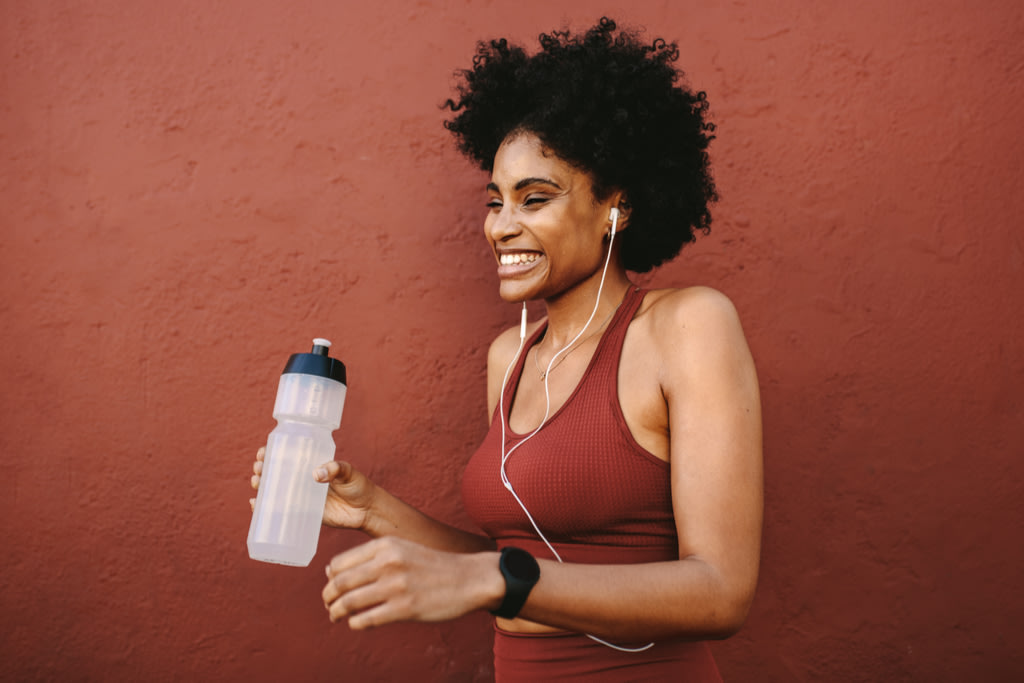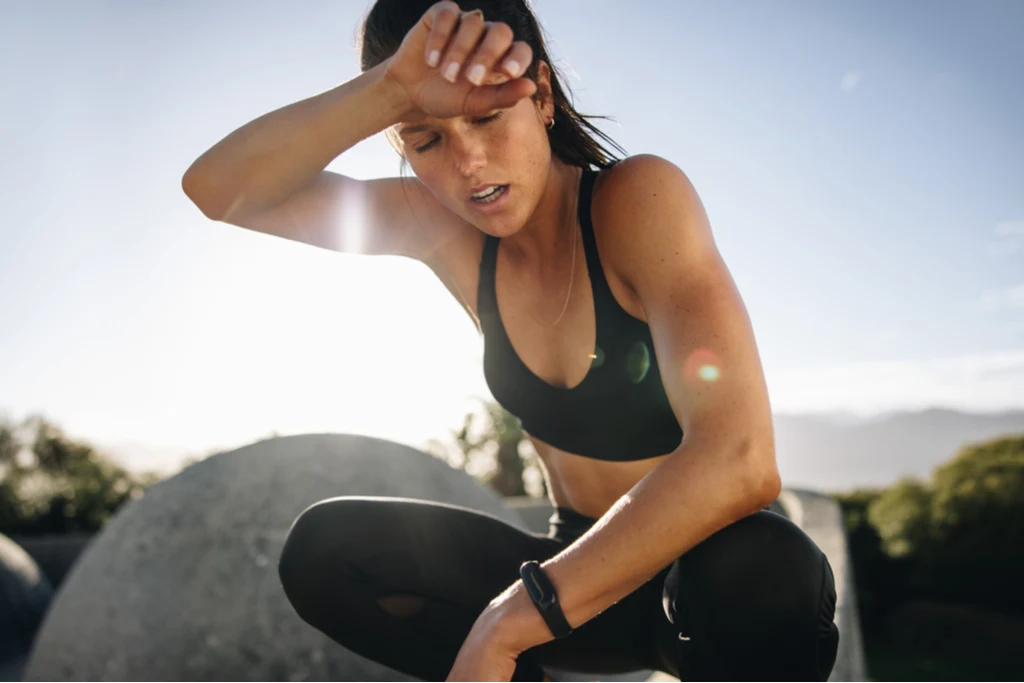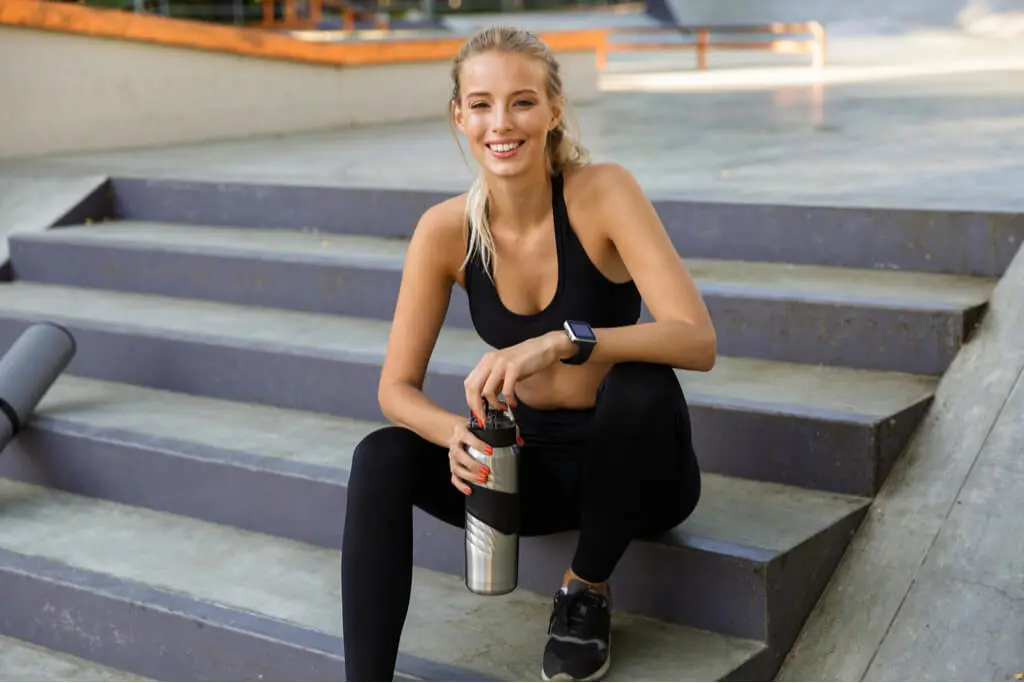How Much Water Should You Drink A Day?

September 27, 2019

Have you ever thought to yourself, how much water should I drink a day? Is the advice to drink at least eight glasses a day fact or fiction? These are common questions, but hydration isn’t as simple as a single recommendation for everyone. There’s actually a lot more you should consider, including how active you are, how much you sweat and external factors like the weather.
Being well-hydrated is fundamental to good health. If you are just starting to work out, it’s important to be aware of your hydration needs and how to stay hydrated to ensure your body’s fluids are properly replenished.
Drinking enough water each day will allow you to function and exercise at an optimal level.
What is hydration?
Hydration is the process of replacing water lost from your body. It is essential to stay hydrated because more than half (about 50-70%) of your body is made up of water! (As the meme says, we humans are basically just cucumbers with anxiety.)
Staying hydrated is all about drinking enough water for your body and activity levels, and understanding the different ways your body is losing fluid.
What is proper hydration?
Many national health guidelines, including those from NHS, recommend drinking at least 2 litres (68 fluid oz) of water a day.
Another simple way to calculate how much water your body needs is to divide your body weight (in pounds) by two, and that number is how much water, in fluid ounces, you should be drinking each day.
It’s important to stay well-hydrated because the water inside your body aids many vital functions, such as lubricating your joints, keeping your body temperature stable and moving nutrients to where they’re needed.
Recent studies have found that being well hydrated may also:
A range of factors will affect what fluid intake is optimal for you, including the air temperature, how much you sweat or if you're regularly exercising.
It’s also worth considering what you’re eating — many fruits and vegetables have high water content and can help to keep you hydrated.
Signs your body is well-hydrated include pale yellow to clear urine and making a trip to the loo at least every few hours. Feeling thirsty or noticing dark urine? It’s time for a glass of H2O.

What is dehydration?
Dehydration can happen when your body has lost more water than you’ve taken in.
If you are dehydrated, your body’s water balance is disrupted, and your body may not function as it should.
What are the signs of dehydration?
You may have experienced a symptom of mild dehydration before. These symptoms can include:
Feeling thirsty
Dark urine
Difficulty concentrating
More severe cases of dehydration may include the following symptoms:
Fatigue
Headaches
Lightheadedness
Heat cramps (painful spasms in the muscles).
Dehydration can also lead to heat exhaustion, which is characterised by:
Excessive sweating
An increased pulse and low blood pressure
Lightheadedness
Heatstroke is the more severe form of dehydration. Symptoms may include:
Lack of sweat
High body temperature
Dry skin that feels hot to the touch.
In extreme cases, heatstroke can lead you to collapse, requiring hospitalisation and treatment with an intravenous drip.
How you lose water from your body
Sweating and heavy breathing after a fast-paced HIIT session or a strenuous workout can be a sign you have really challenged yourself — but it’s also a way to lose water from your body.
Some health conditions or medications can also lead to fluid loss, so it’s important to discuss any concerns you might have with your medical practitioner.
Sweating
Sweating during a workout is your body’s way of keeping cool. Your sweat glands release fluid (mainly water) which evaporates from your skin and helps to keep your body temperature stable.
Sweating is one way you lose water from your body, but exercise is not the only trigger. Sweat can be produced when you feel nervous, eat spicy foods, drink excessive amounts of alcohol, or when the temperature is hot or humid.
The amount you sweat can also be influenced by your genetic makeup. If you’re someone who sweats a lot, it’s a good idea to always carry a drink bottle with you to replenish your fluids!
Breathing
The moisture released every time you breathe also impacts hydration, even more so when you breathe through your mouth. On average, water evaporation from oral breathing is 42% higher compared to nasal breathing even when you sleep!
When you do a workout, your breathing becomes faster and heavier and often through your mouth, meaning you will be losing more fluid than compared to your regular breathing.

How to rehydrate
Drinking water in moderate amounts throughout the day is one way to stay well-hydrated, starting with when you wake up.
You lose water while you sleep, so starting the day with a glass of water can help to replenish your body.
According to a 2007 study on exercise and fluid replacement by the American College of Sports Medicine, you should hydrate before, during and after exercise. This will help you to maintain and replace water and electrolyte levels and to avoid dehydration and is especially important when starting a new fitness program.
When you perspire, you lose electrolytes through your sweat. These are essential minerals, and electrolyte drinks may assist rehydration by helping the body rebalance. Generally, water and a healthy diet will suffice, unless you are doing a long sports event or a professional athlete doing high levels of training.
While drinking water is the best way to stay hydrated, some other ways you can maintain your hydration include:
Grab a green smoothie
Some foods like spinach or other greens have high water content, so including them in your smoothie is a great way to get extra water.
Cucumber and mango have the added benefit of providing sweetness and coconut water is also rich in electrolytes.
Drinking tea
If you rely on tea for extra hydration, chamomile, peppermint, ginger, rooibos and other herbal teas are good caffeine-free options. The bonus with drinking tea is that most herbal teas provide a dose of antioxidants too.
Sipping kombucha
Kombucha is made from fermented tea and is a healthier alternative to soft drinks. It includes electrolytes and beneficial probiotics, which can be good for your gut. When choosing the store-bought kind, just be mindful of the sugar content.
Staying hydrated and healthy
Hydration is just as important as your nutrition — so take note of how much water you’re drinking during the day, including on the days you’re working out.
If you’re unsure how much water you should be drinking, a health professional or dietician can provide you with recommendations based on your lifestyle.

A more empowered you starts with Sweat, and our editorial team is here to bring you the latest fitness tips, trainer recommendations, wellbeing news, nutritional advice, nourishing recipes and free workouts.
* Disclaimer: This blog post is not intended to replace the advice of a medical professional. The above information should not be used to diagnose, treat, or prevent any disease or medical condition. Please consult your doctor before making any changes to your diet, sleep methods, daily activity, or fitness routine. Sweat assumes no responsibility for any personal injury or damage sustained by any recommendations, opinions, or advice given in this article.
Nutrition